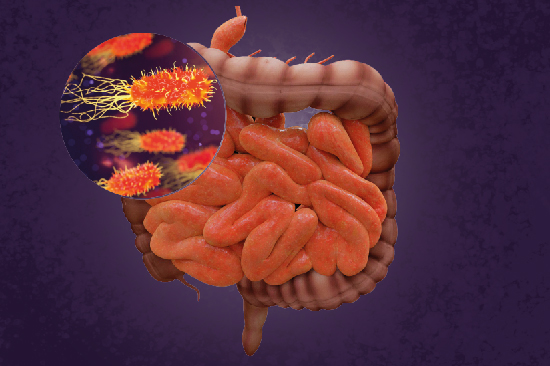
-
A research team from the Institute of Agrochemistry and Food Technology (IATA) analyzes the influence of intestinal microorganisms on the incidence of coronavirus and on the severity of the symptoms of the disease
-
In collaboration with the Arnau de Vilanova Hospital in Valencia they are investigating the immunological mechanisms by which the microbiome can protect or aggravate the infection by COVID-19 in cancer patients and general population
A research team from the Institute of Agrochemistry and Food Technology (IATA), a center belonging to the Spanish National Research Council (CSIC), is studying the relationship between microorganisms living in the human intestine and the rate of infection by the SARS-CoV-2 virus that causes COVID-19 disease, as well as the severity of the symptoms associated with an excessive immune response in the body. The results, which are expected at the end of the year, will advance the knowledge of the infection caused by the coronavirus in patients of more risk like the oncological ones and in the rest of the population.
The intestinal microbiome (microorganisms and their genes) regulates the functioning of our immune system, and can influence the risk of suffering infections and the defensive response against them. In order to evaluate if this also happens in the infection by the coronavirus SARS-CoV-2, the research team led by the research professor of the CSIC in the IATA Yolanda Sanz Herranz works in the project "Influence of the intestinal microbiome in the infection COVID-19 and in the effectiveness of the immunotherapy in patients with cancer and controls-BICOIN", financed by the Platform Global Health of the CSIC.
The project aims to determine whether the characteristics of the intestinal microbiome of the individual are related to the rate of infection by COVID-19 and the severity of the symptoms of the disease and its complications, derived from the development of the so-called 'cytokine storm'. This process occurs as a consequence of an excessive immune reaction that causes systemic inflammation and is related to clinical deterioration and mortality.
Furthermore, this project will serve to identify the immunological mechanisms by which the microbiome can confer protection or susceptibility to COVID-19 infection and influence the individual's immune response. For example, in the generation of protective antibodies against the virus and in the response to immunotherapies (a type of cancer therapy that inhibits the point of immune control) in oncological patients, processes that could also protect against COVID-19 infection.
For Yolanda Sanz, "this study will allow a better prediction of the risk and prognosis of the disease, integrating information not only of the subject's genome and its comorbidities, but also of its microbiome, that is to say, to define more precisely who are the patients of more risk". For the IATA-CSIC researcher, this will also "allow a more precise prediction of the efficacy of immune-based therapies, by including oncological patients subjected to these treatments in the study".
The research team hopes to have the first results of the study by the end of this year. These will advance knowledge about SARS-CoV2 infection in higher risk patients such as cancer patients, as well as in the general population, helping to mitigate and overcome the effects of the pandemic. The study has been financed by the Global Health Platform of the CSIC and is being carried out in collaboration with the Arnau de Vilanova Hospital in Valencia.
More information:
https://pti-saludglobal-covid19.corp.csic.es/influencia-del-microbioma-i...

